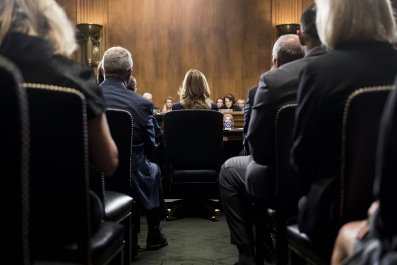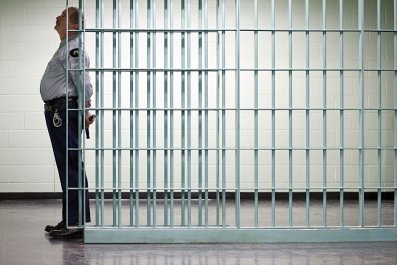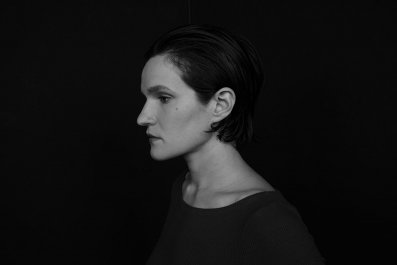It was just before 6 a.m. when police officers raided Daniil Markin's apartment in Barnaul, a small Russian city some 2,000 miles from Moscow. Markin, a film student who was 18 at the time of the July 2017 raid, had no idea why police had burst into his home. The officers, he says, were in no hurry to explain. Instead, they removed his computers, smartphone and other electronic devices, then drove him to the local branch of the Center for Combating Extremism, a police department within Russia's powerful Interior Ministry.
Officers from the so-called Center E then informed Markin that he was being charged with hate speech against Christians over a handful of images that he had either reposted or saved to his account on VKontakte, Russia's version of Facebook, which is also known as VK. The earliest dated from 2013, when he was just 13. Markin did not create any of the images, most of which had already been widely circulated online, but he now faces up to five years in prison over the charges, if found guilty.
The online memes that landed Markin in legal trouble may have been offensive to some Christians, but Alexander Yeremenko, his lawyer, says there are no grounds on which to classify them as hate speech. One featured Jon Snow, a character from Game of Thrones, with a halo and the words "Jon Snow is risen! Truly he is risen!" The caption, a reference to Snow's magical resurrection in the popular HBO series, was a parody of the words that Russian Orthodox Christians traditionally use to greet each other at Easter. Another depicted three angels smoking marijuana from a bong. Investigators, Markin says, laughed at the pictures as they scrolled through his VKontakte account.
"To say I was shocked when they told me what I was being charged with would be putting it mildly," says Markin, whose ongoing trial began in June. On top of the criminal charges, the Russian government has added him to its list of extremists and terrorists, which includes neo-Nazis and supporters of the Islamic State militant group (ISIS). The status means he is barred from using a bank card. Other financial restrictions, which apply to everyone on the list, limit him to withdrawing a maximum of 10,000 rubles ($150) from his bank account a month. "I saved a few images that no one even really saw, and for that I have been included on a list that also includes people who kill in Iraq and Syria," he says.
The police raid on Markin's home came amid Russia's escalating crackdown on social media activity. Agora, a Russian human rights group, says law enforcement has opened 411 criminal cases against internet users in Russia in 2017, compared with 298 cases in 2016. Forty-three people were given prison terms ranging from several months to just under four years. The overwhelming majority of the charges were for reposts or simply—as Markin did—saving images to their personal photo albums on social media accounts. Prosecutions have involved satirical memes lampooning the Russian Orthodox Church, a key Kremlin ally, as well as ones criticizing Russia's military action in Ukraine.
Critics say the prosecutions are the latest step in a long-running crackdown on freedom of speech that began in the early years of President Vladimir Putin's 18-year-rule, when major media outlets were forcibly brought under Kremlin control.
In another ongoing trial, Eduard Nikitin, a 42-year-old unemployed man from St. Petersburg, is facing five years behind bars after police accused him of "inciting hatred" over a series of politically charged images and memes that he posted on VKontakte. One of the images was a satirical drawing that mocked Putin's supporters as ignorant and uneducated. And in early September, Natalia Kovaleva, a 42-year-old woman from Saratov in central Russia, was charged with extremism after she posted a series of Russian folk songs accusing local courts of corruption. Police, who raided her home, say she is suspected of "besmirching the honor and dignity" of Saratov region judges.
"I think they are trying to charge people…who go to protests, who support [opposition leader Alexei] Navalny," Alexei Bushmakov, a lawyer who has defended suspects charged with extremism, told Russia's 66.ru website recently.
Formed in 2008, Center E has about 100 employees in Moscow, with several hundred more nationwide. It wasn't always focused on cracking down on online political dissent. Its officers played a major role in breaking up Russia's white power movement in the late 2000s, putting large numbers of violent ultra-nationalists behind bars. "They jailed hundreds of these people," says Alexander Verkhovsky, director of Moscow's Sova Center, a human rights nonprofit that monitors extremism. "And this was often dangerous work—not like looking at VKontakte all day."
Now, however, Russian opposition activists have begun referring to Center E officers as okhranka—after the name of a czarist-era secret police force. The overwhelming majority of charges are connected to posts on VKontakte rather than on Western social networks. Critics say that's because the Russian company is too willing to hand over data on users to the authorities. VKontakte says it has no choice but to cooperate with police, but Mail.Ru, its parent company, is calling for the reposting of "extremist" content to be decriminalized and for an amnesty for those already convicted. It has also pledged it will introduce an option for VKontakte users to make content totally private.
In the meantime, the prosecutions keep coming. Other grounds for extremism charges have included memes or images that feature Nazi symbols, regardless of the context in which they were posted. Until four years ago, it was only an offense under Russian law to post symbols of the Third Reich if the aim was to promote Nazism. In 2014, however, that caveat was removed from the law in a move to combat what Russian authorities said were attempts to "rehabilitate Nazism," opening the way to what critics say are frequently absurd prosecutions.
In one case, police in central Russia charged a man after he "liked" a promotional poster for the Hollywood movie American History X, which contained a swastika. The movie, starring Edward Norton as a violent skinhead who reforms while in prison, has not been banned in Russia and has even been shown on state television. In another case, a 16-year-old opposition supporter in Vladivostok, in eastern Russia, was prosecuted after saving an image of a left-facing swastika—the Buddhist symbol of light and peace—to his VKontakte photo album. Both suspects were eventually ordered to pay small fines, but critics say the disruption to the lives of those falsely charged can be significant.
"On paper, some of these laws against extremism are good because they are aimed at combating racism and discrimination'" says Dmitry Dzhulai, a former police officer who worked at Center E from 2014 through 2016. "But recently they are being used against people that the authorities disapprove of—such as political activists and opposition figures."
But Dzhulai and other former Center E employees tell Newsweek that political repression isn't the only reason for the increasing numbers of internet users facing extremism charges. A major factor, they say, is relentless pressure from Center E's bosses to meet ever-growing arrest quotas. And police chiefs aren't too fussy about the methods officers use to meet targets. (Center E did not respond to a request for comment.)
"Officially, there is no quota system, but every year more crimes have to be uncovered than in the previous year," says Dzhulai, now a lawyer in Moscow. "The easiest and simplest way to do this is to use a search engine to seek out memes and stupid things that people have written on VK." Police raids and criminal charges often follow.
"These are just statistics for the sake of statistics," says Vladimir Vorontsov, another former Center E officer, during an interview in Moscow. He notes that while Russian authorities initially drew up some anti-extremist laws to clamp down on dissent, they are now often being applied, almost at random, by Center E employees desperate to please their bosses.
"When I worked in Center E," says Vorontsov, "people didn't voice their opinions about the work. They just said, 'Well, this is my job, so I'll do what I'm told.' Those employees who spend their time searching the internet don't consider this shameful. They are more concerned with keeping their bosses happy and are ready to put other people's lives and freedom on the line for this."
Center E officers aren't the only ones searching for suspected online extremism. "There are many anonymous complaints," says Dzhulai. "Others are from people who have had an online argument with someone and decided to get revenge." It's a practice, he says, that has echoes of the Soviet era, when relatives informed on relatives, and neighbors on neighbors, over "anti-Communist" activities or comments.
Inevitably, the crackdown has caused VKontakte ordinary Russians to think twice about what they post online, especially on VKontakte. "I try not to worry, but it's always in the back of my mind that I could face charges for something I post or repost," says Yelena, a 33-year-old charity worker who asked that her surname not be published. And growing concerns are leading to rising anger.
"People see that they and their children can become victims, that the laws are unfair, and that the law enforcement agencies are using these laws in their own interest," says Andrey Petsev, an analyst at the Carnegie Moscow Center think tank. "Inevitably, a question arises: Why are people going to prison for memes while corrupt officials receive suspended sentences? As more and more people pose it, the Kremlin has only itself to blame."
Even Putin appears to have concerns. During a question-and-answer session in June, the Russian president said that "those that are guilty must be called to account" but warned that there was a danger some Center E changes were being pursued to "absurdity." Then, on October 3, Putin introduced proposals to parliament that would decriminalize "extremist" reposts. If approved, however, the president's amendments to the law would still allow courts to jail internet users for up to 15 days over their social media activity.
For now, Markin, the film student, is left facing the sobering possibility that he could spend his early 20s behind bars over an irreverent joke about a Game of Thrones character. "Russia is slowly but surely killing me," he says. "And the most important thing is that this can happen to absolutely anyone in Putin's Russia."














